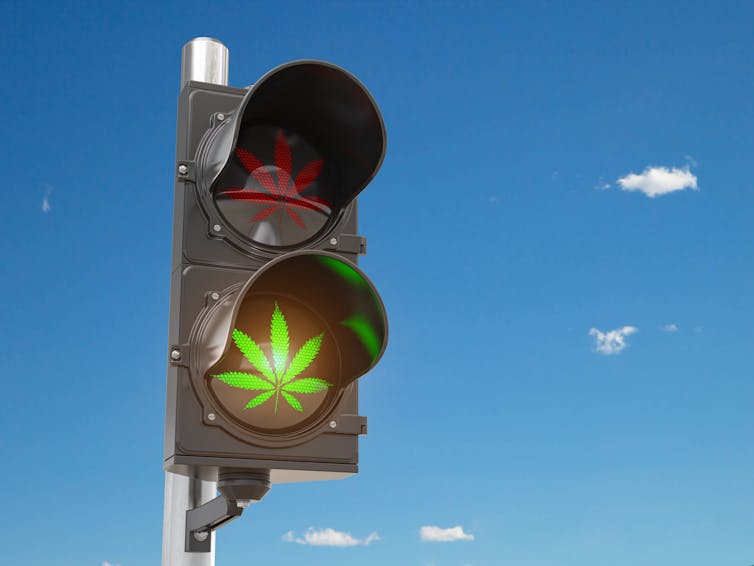10 pros and cons of legalising the drug
- Written by The Conversation
The latest poll[1] shows a drop in support by New Zealanders for the recreational use of cannabis ahead of next month’s referendum[2] on the issue.
The 1 NEWS Colmar Brunton Poll[3] found only 35% of people polled said they supported the bill, down from 40% in June’s poll. Those who said they did not support the bill were at 53%, up from 49% in June. Another 11% either did not know or refused to answer.
Other polls had earlier shown a close vote, neck and neck[4], too close to call[5].
National leader Judith Collins says the party caucus will vote no in the referendum[6]. Prime Minister Jacinda Ardern has maintained a strict “no comment” on her voting intentions, despite admitting[7] she once smoked cannabis “a long time ago”.
So with less than a month to go to the vote, if you’re undecided, here’s a list of the pros and cons of what the consequences could be.
Pros: taking control
 Branding Pot/Shutterstock
1. Economic growth
Establishing a legal cannabis industry creates a range of skilled and unskilled jobs. It could generate more than NZ$640 million[8] in tax revenue for the NZ government.
The cannabis industry is one of the fastest-growing job markets in the United States[9]. In one year, cannabis retailers netted the state of Massachusetts US$393 million[10] in gross sales.
Two years after launching a legal cannabis market, California has surpassed US$1 billion[11] in tax revenue.
Read more:
If reducing harm to society is the goal, a cost-benefit analysis shows cannabis prohibition has failed[12]
2. Health not handcuffs
Prohibition has not stopped New Zealanders from using cannabis. Research[13] shows 15% of men and 8% of women in NZ used cannabis over a 12-month period in 2012-13.
Legalising cannabis could save the NZ justice system a staggering NZ$11.4 million[14] a year. Not to mention the social benefit of no longer incarcerating non-violent, otherwise law-abiding citizens who then have to cope with a life-long criminal record[15].
Māori have higher rates of cannabis use than non-Māori. Even accounting for higher usage rates, research[16] found Māori are more likely to be convicted on cannabis charges then non-Māori.
By legalising cannabis, use becomes an issue of health and social welfare rather than a criminal one[17].
3. Improves access for health patients
Cannabis is used as therapy for a number of health applications. It has been legally available for medical use[18] in NZ since April 2020.
Cannabis is used to treat[19] nausea and vomiting, the common side effects of cancer treatment. It may be a therapy[20] to treat epileptic seizures.
It has been used to treat[21] muscle spasms among those with multiple sclerosis. It has also helped people alleviate chronic pain[22], headaches and anxiety.
If cannabis is legalised for recreational use, those using it for medical purposes will have greater access[23] at a more affordable price.
4. Regulated for consumer safety
A standard requirement for legalised cannabis markets includes product testing[24], which means consumers know more about the products they are using.
Cannabis bought off the street can contain fungus, harmful substances, mould and pesticides. Mandatory testing ensures the cannabis is free of toxins[25].
To protect children in the United States from exposure to cannabis, Alaska, Colorado, Oregon and Washington all passed child-resistant packaging[26] regulations.
Under New Zealand’s referendum, any retailers who sell cannabis to people aged under 20 would face serious penalties. To further deter youth, the NZ Drug Foundation, which is leading a yes vote, unequivocally supports the referendum’s inclusion of advertising bans.
5. Takes money away from street gangs
Over the past two-and-half years, street gangs in New Zealand have grown by more than 30%[27]. The illegal cannabis market, estimated to be worth NZ$1–3 billion[28], potentially funds these gangs to some extent.
In Colorado in the US, 90%[29] of the cannabis market is supplied under regulation. Over the past decade there, cannabis seizures by border control are at their lowest levels and their value has reduced by millions of dollars[30].
Legalising cannabis places control of the market in the hands of the government rather then criminals.
Read more:
The missing question from New Zealand's cannabis debate: what about personal freedom and individual rights?[31]
Branding Pot/Shutterstock
1. Economic growth
Establishing a legal cannabis industry creates a range of skilled and unskilled jobs. It could generate more than NZ$640 million[8] in tax revenue for the NZ government.
The cannabis industry is one of the fastest-growing job markets in the United States[9]. In one year, cannabis retailers netted the state of Massachusetts US$393 million[10] in gross sales.
Two years after launching a legal cannabis market, California has surpassed US$1 billion[11] in tax revenue.
Read more:
If reducing harm to society is the goal, a cost-benefit analysis shows cannabis prohibition has failed[12]
2. Health not handcuffs
Prohibition has not stopped New Zealanders from using cannabis. Research[13] shows 15% of men and 8% of women in NZ used cannabis over a 12-month period in 2012-13.
Legalising cannabis could save the NZ justice system a staggering NZ$11.4 million[14] a year. Not to mention the social benefit of no longer incarcerating non-violent, otherwise law-abiding citizens who then have to cope with a life-long criminal record[15].
Māori have higher rates of cannabis use than non-Māori. Even accounting for higher usage rates, research[16] found Māori are more likely to be convicted on cannabis charges then non-Māori.
By legalising cannabis, use becomes an issue of health and social welfare rather than a criminal one[17].
3. Improves access for health patients
Cannabis is used as therapy for a number of health applications. It has been legally available for medical use[18] in NZ since April 2020.
Cannabis is used to treat[19] nausea and vomiting, the common side effects of cancer treatment. It may be a therapy[20] to treat epileptic seizures.
It has been used to treat[21] muscle spasms among those with multiple sclerosis. It has also helped people alleviate chronic pain[22], headaches and anxiety.
If cannabis is legalised for recreational use, those using it for medical purposes will have greater access[23] at a more affordable price.
4. Regulated for consumer safety
A standard requirement for legalised cannabis markets includes product testing[24], which means consumers know more about the products they are using.
Cannabis bought off the street can contain fungus, harmful substances, mould and pesticides. Mandatory testing ensures the cannabis is free of toxins[25].
To protect children in the United States from exposure to cannabis, Alaska, Colorado, Oregon and Washington all passed child-resistant packaging[26] regulations.
Under New Zealand’s referendum, any retailers who sell cannabis to people aged under 20 would face serious penalties. To further deter youth, the NZ Drug Foundation, which is leading a yes vote, unequivocally supports the referendum’s inclusion of advertising bans.
5. Takes money away from street gangs
Over the past two-and-half years, street gangs in New Zealand have grown by more than 30%[27]. The illegal cannabis market, estimated to be worth NZ$1–3 billion[28], potentially funds these gangs to some extent.
In Colorado in the US, 90%[29] of the cannabis market is supplied under regulation. Over the past decade there, cannabis seizures by border control are at their lowest levels and their value has reduced by millions of dollars[30].
Legalising cannabis places control of the market in the hands of the government rather then criminals.
Read more:
The missing question from New Zealand's cannabis debate: what about personal freedom and individual rights?[31]
 Overseas eyes are watching the referendum, which could go either way.
Shutterstock/Maxx Studio
Cons: social and fiscal
Overseas eyes are watching the referendum, which could go either way.
Shutterstock/Maxx Studio
Cons: social and fiscal
 Branding Pot/Shutterstock
1. Unknown costs for society and taxpayers
The long-term health effects are not fully understood. Similar to tobacco, the negative health consequences of cannabis might not be realised for decades. Again, in Colorado, for every cannabis tax dollar raised, its citizens spend US$4.50[32] to offset the negative effects of legalisation.
2. It will turn NZ’s youth to other drugs
A Christchurch Health and Development study[33] shows adolescent weekly users of cannabis were 100 times more likely to use other illicit drugs.
Read more:
Why NZ's cannabis bill needs to stop industry from influencing policy[34]
Concerns have been raised about the level of influence[35] the cannabis industry has over the drafting of legislation since its motivation is profit maximisation, not public health[36].
3. Workplace safety and productivity
A 25-year study[37] in Norway shows workers who use cannabis are less dedicated to their work than those who don’t.
In the US, cannabis use by employees[38] leads to increases in absenteeism, accidents, job turnover and worker compensation claims.
4. Bad for the environment
Cannabis plants require double[39] the water needed to grow grapes for wine. Growing cannabis may cause deforestation, habitat destruction, river diversion and soil erosion.
When grown hydroponically, yearly greenhouse gas emissions in the US equal that of 3 million[40] cars.
5. Property prices could rise, or fall
Once again in Colorado in the US, legalising cannabis was found[41] to increase the value of property prices by up to 6%.
A separate study[42] in Colorado found house prices could increase by up to 8.4% if they were within 160m of a retail outlet selling cannabis.
But 42%[43] of Canadians believe a cannabis retailer will negatively affect their home values.
The median housing market price in NZ recently rose by 12%[44] in one year. Further sharp growth could price many[45] out of the market.
Still undecided?
There are just over two weeks to go now before New Zealanders vote on the cannabis referendum[46]. If you still can’t decide, then head to the Prime Minister’s Science Adviser website[47] for more information, or watch the video below.
Read more:
Reforming cannabis laws is a complex challenge, but New Zealand's history of drug reform holds important lessons[48]
Science and the Cannabis Referendum.
Branding Pot/Shutterstock
1. Unknown costs for society and taxpayers
The long-term health effects are not fully understood. Similar to tobacco, the negative health consequences of cannabis might not be realised for decades. Again, in Colorado, for every cannabis tax dollar raised, its citizens spend US$4.50[32] to offset the negative effects of legalisation.
2. It will turn NZ’s youth to other drugs
A Christchurch Health and Development study[33] shows adolescent weekly users of cannabis were 100 times more likely to use other illicit drugs.
Read more:
Why NZ's cannabis bill needs to stop industry from influencing policy[34]
Concerns have been raised about the level of influence[35] the cannabis industry has over the drafting of legislation since its motivation is profit maximisation, not public health[36].
3. Workplace safety and productivity
A 25-year study[37] in Norway shows workers who use cannabis are less dedicated to their work than those who don’t.
In the US, cannabis use by employees[38] leads to increases in absenteeism, accidents, job turnover and worker compensation claims.
4. Bad for the environment
Cannabis plants require double[39] the water needed to grow grapes for wine. Growing cannabis may cause deforestation, habitat destruction, river diversion and soil erosion.
When grown hydroponically, yearly greenhouse gas emissions in the US equal that of 3 million[40] cars.
5. Property prices could rise, or fall
Once again in Colorado in the US, legalising cannabis was found[41] to increase the value of property prices by up to 6%.
A separate study[42] in Colorado found house prices could increase by up to 8.4% if they were within 160m of a retail outlet selling cannabis.
But 42%[43] of Canadians believe a cannabis retailer will negatively affect their home values.
The median housing market price in NZ recently rose by 12%[44] in one year. Further sharp growth could price many[45] out of the market.
Still undecided?
There are just over two weeks to go now before New Zealanders vote on the cannabis referendum[46]. If you still can’t decide, then head to the Prime Minister’s Science Adviser website[47] for more information, or watch the video below.
Read more:
Reforming cannabis laws is a complex challenge, but New Zealand's history of drug reform holds important lessons[48]
Science and the Cannabis Referendum.References
- ^ latest poll (www.tvnz.co.nz)
- ^ referendum (www.referendums.govt.nz)
- ^ 1 NEWS Colmar Brunton Poll (static.colmarbrunton.co.nz)
- ^ neck and neck (www.stuff.co.nz)
- ^ too close to call (www.newshub.co.nz)
- ^ vote no in the referendum (www.rnz.co.nz)
- ^ admitting (www.tvnz.co.nz)
- ^ NZ$640 million (www.nzherald.co.nz)
- ^ United States (www.forbes.com)
- ^ US$393 million (mass-cannabis-control.com)
- ^ US$1 billion (www.ocregister.com)
- ^ If reducing harm to society is the goal, a cost-benefit analysis shows cannabis prohibition has failed (theconversation.com)
- ^ Research (www.health.govt.nz)
- ^ NZ$11.4 million (www.nzherald.co.nz)
- ^ life-long criminal record (www.healthnothandcuffs.nz)
- ^ Cannabis, the cannabis referendum and Māori youth: a review from a lifecourse perspective (www.tandfonline.com)
- ^ Facing the option for the legalisation of cannabis use and supply in New Zealand: An overview of relevant evidence, concepts and considerations (onlinelibrary.wiley.com)
- ^ medical use (www.health.govt.nz)
- ^ Medical marijuana (www.health.harvard.edu)
- ^ therapy (pubmed.ncbi.nlm.nih.gov)
- ^ The therapeutic potential of cannabis and cannabinoids (pubmed.ncbi.nlm.nih.gov)
- ^ Therapeutic Benefits of Cannabis: A Patient Survey (www.ncbi.nlm.nih.gov)
- ^ greater access (www.stuff.co.nz)
- ^ product testing (www.drugpolicy.org)
- ^ 80 Percent Of Medical Marijuana Tested At Recent NorCal Conference Is Tainted With Mold, Other Toxins (sfist.com)
- ^ Unintentional Pediatric Exposures to Marijuana in Colorado, 2009-2015 (jamanetwork.com)
- ^ 30% (www.rnz.co.nz)
- ^ NZ$1–3 billion (www.drugfoundation.org.nz)
- ^ 90% (www.agfseries2.com)
- ^ millions of dollars (www.cbp.gov)
- ^ The missing question from New Zealand's cannabis debate: what about personal freedom and individual rights? (theconversation.com)
- ^ US$4.50 (www.ccu.edu)
- ^ Cannabis use and other illicit drug use: testing the cannabis gateway hypothesis (onlinelibrary.wiley.com)
- ^ Why NZ's cannabis bill needs to stop industry from influencing policy (theconversation.com)
- ^ influence (www.marketwatch.com)
- ^ not public health (saynopetodope.org.nz)
- ^ The Role of Study and Work in Cannabis Use and Dependence Trajectories among Young Adult Frequent Cannabis Users (www.ncbi.nlm.nih.gov)
- ^ cannabis use by employees (www.shrm.org)
- ^ double (marijuana.procon.org)
- ^ 3 million (www.theguardian.com)
- ^ THE EFFECT OF LEGALIZING RETAIL MARIJUANA ON HOUSING VALUES: EVIDENCE FROM COLORADO (onlinelibrary.wiley.com)
- ^ study (www.cato.org)
- ^ 42% (www.zoocasa.com)
- ^ 12% (www.newshub.co.nz)
- ^ many (theconversation.com)
- ^ cannabis referendum (www.referendums.govt.nz)
- ^ website (www.pmcsa.ac.nz)
- ^ Reforming cannabis laws is a complex challenge, but New Zealand's history of drug reform holds important lessons (theconversation.com)

















